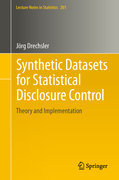
Synthetic datasets for statistical disclosure control: theory and implementation
Drechsler, Jörg
The aim of this book is to give the reader a detailed introduction to the different approaches to generating multiply imputed synthetic datasets. It describes all approaches that have been developed so far, provides a brief history of synthetic datasets, and gives useful hints on how to deal with real data problems like nonresponse, skip patterns, or logical constraints. Each chapter isdedicated to one approach, first describing the general concept followed by adetailed application to a real dataset providing useful guidelines on how to implement the theory in practice. The discussed multiple imputation approachesinclude imputation for nonresponse, generating fully synthetic datasets, generating partially synthetic datasets, generating synthetic datasets when the original data is subject to nonresponse, and a two-stage imputation approach that helps to better address the omnipresent trade-off between analytical validity and the risk of disclosure. The book concludes with a glimpse into the future of synthetic datasets, discussing the potential benefits and possible obstacles of the approach and ways to address the concerns of data users and their understandable discomfort with using data that doesn’t consist only of the originally collected values.. The book is intended for researchers and practitioners alike. It helps the researcher to find the state of the art in synthetic data summarized in one book with full reference to all relevant papers on the topic. But it is also useful for the practitioner at the statistical agency who is considering the synthetic data approach for data dissemination in the future and wants to get familiar with the topic. Is the first book that fully covers all different approaches to generatingmultiply imputed synthetic datasets. Combination of theory and practical implementation issues makes it appealing to the researcher and the practitioner alike. Obtaining access to real datasets which is already burdensome for researchers will become more and more complicated in the future, due to rising confidentiality concerns. Dissemination strategies, like generating synthetic datasets, which allow the release of data with high analytical validity while guaranteeing the confidentiality of the respondent, are greatly needed. Addresses problems of trying to find ways to benefit society by releasing microdata that simultaneously preserve individuals’ confidential information and yet allow valid inferences at some level of detail. INDICE: Introduction. Background on Multiply Imputed Synthetic Datasets. Background on Multiple Imputation. The IAB Establishment Panel. Multiple Imputation for Nonresponse. Fully Synthetic Datasets. Partially Synthetic Datasets. Multiple Imputation for Nonresponse and Statistical Disclosure Control. A Two-Stage Imputation Procedure to Balance the Risk-Utility Trade-Off. Chances and Obstacles for Multiply Imputed Synthetic Datasets.
- ISBN: 978-1-4614-0325-8
- Editorial: Springer New York
- Encuadernacion: Rústica
- Páginas: 162
- Fecha Publicación: 28/08/2011
- Nº Volúmenes: 1
- Idioma: Inglés
